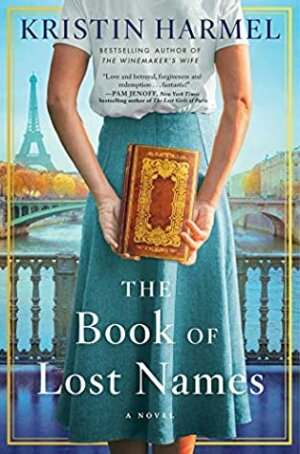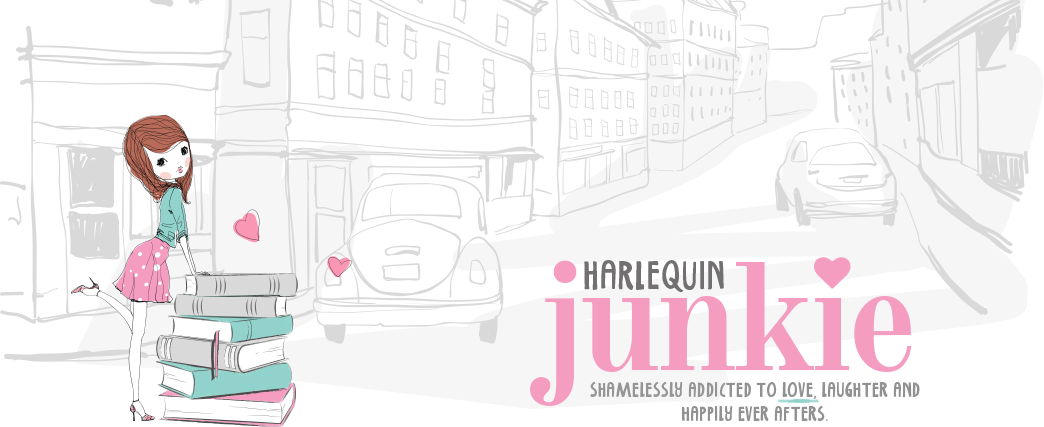Today, HJ is pleased to share with you Kristin Harmel’s new release: The Book of Lost Names
Inspired by an astonishing true story from World War II, a young woman with a talent for forgery helps hundreds of Jewish children flee the Nazis in this unforgettable historical novel from the international bestselling author Kristin Harmel

The accompanying article discusses the looting of libraries by the Nazis across Europe during World War II—an experience Eva remembers well—and the search to reunite people with the texts taken from them so long ago. The book in the photograph, an eighteenth-century religious text thought to have been taken from France in the waning days of the war, is one of the most fascinating cases. Now housed in Berlin’s Zentral- und Landesbibliothek library, it appears to contain some sort of code, but researchers don’t know where it came from—or what the code means. Only Eva holds the answer—but will she have the strength to revisit old memories and help reunite those lost during the war?
As a graduate student in 1942, Eva was forced to flee Paris after the arrest of her father, a Polish Jew. Finding refuge in a small mountain town in the Free Zone, she begins forging identity documents for Jewish children fleeing to neutral Switzerland. But erasing people comes with a price, and along with a mysterious, handsome forger named Rémy, Eva decides she must find a way to preserve the real names of the children who are too young to remember who they really are. The records they keep in The Book of Lost Names will become even more vital when the resistance cell they work for is betrayed and Rémy disappears.
An engaging and evocative novel reminiscent of The Lost Girls of Paris and The Alice Network, The Book of Lost Names is a testament to the resilience of the human spirit and the power of bravery and love in the face of evil.
Enjoy an exclusive excerpt from The Book of Lost Names
Chapter 1
May 2005
It’s a Saturday morning, and I’m midway through my shift at the Winter Park Public Library when I see it.
The book I last laid eyes on more than six decades ago.
The book I believed had vanished forever.
The book that meant everything to me.
It’s staring out at me from a photograph in the New York Times, which someone has left open on the returns desk. The world goes silent as I reach for the newspaper, my hand trembling nearly as much as it did the last time I held the book. “It can’t be,” I whisper.
I gaze at the picture. A man in his seventies looks back at me, his snowy hair sparse and wispy, his eyes froglike behind bulbous glasses.
“Sixty Years After End of World War II, German Librarian Seeks to Reunite Looted Books with Rightful Owners,” declares the headline, and I want to cry out to the man in the image that I am the rightful owner of the book he’s holding, the faded leather-bound volume with the peeling bottom right corner and the gilded spine bearing the title Epitres et Evangiles. It belongs to me—and to Rémy, a man who died long ago, a man I vowed after the war to think of no more.
But he’s been in my thoughts this week anyhow, despite my best efforts. Tomorrow, the eighth of May, the world will celebrate the sixtieth anniversary of Victory in Europe Day. It’s impossible, with all the young newscasters speaking solemnly of the war as if they could conceivably understand it, not to think of Rémy, not to think of the time we spent together then, not to think of the people we saved and the way it all ended. Though my son tells me I’m blessed to have such a sharp mind in my old age, like many blessings this one is mixed.
Most days, I just long to forget.
I blink away the uninvited thoughts of Rémy and return my attention to the article. The man in the photo is Otto Kühn, a librarian from the Zentral- und Landesbibliothek in Berlin, who has made it his life’s mission to return books looted by the Nazis. There are apparently more than a million such books in his library’s collection alone, but the one he’s holding in the photo— my book—is the one he says keeps him up at night.
“This religious text,” Kühn has told the reporter, “is my favorite among the many mysteries that occupy our shelves. Published in Paris in 1732, it’s a very rare book, but that’s not what makes it extraordinary. It is unique because within it, we find an intriguing puzzle: some sort of code. To whom did it belong? What does the code mean? How did the Germans come to possess it during the war? These are the questions that haunt me.”
I feel tears in my eyes, tears that have no place there. I wipe them away, angry at myself for still being so emotional after all these years. “How nice it must be,” I say softly to Kühn’s picture, “to be haunted by questions rather than ghosts.”
“Um, Mrs. Abrams? Are you talking to that newspaper?”
I’m jolted out of the fog of my memory by the voice of Jenny Fish, the library’s assistant manager. She’s the type who complains about everything—and who seems to enjoy suggesting at every opportunity that since I’m eighty-six, I might want to think about retiring soon. She is always eyeing me suspiciously, as if she simply cannot believe that at my age, I’d still want to work here.
She doesn’t understand what it means to love books so passionately that you would die without them, that you would simply stop breathing, stop existing. It is quite beyond me, in fact, why she became a librarian in the first place.
“Yes, Jenny, indeed I am,” I reply, without looking up.
“Yes, well, you probably shouldn’t be doing that in front of library guests.” She says it without a trace of irony. “They might think you’re senile.” She does not have a sense of humor.
“Thank you, Jenny. Your advice is always so very helpful.”
She nods solemnly. It is also apparently beyond her comprehension that someone who looks like me—small, white-haired, grandmotherly—is capable of sarcasm.
Today, though, I have no time for her. All I can think about is the book. The book that held so many secrets. The book that was taken from me before I could learn whether it contained the one answer I so desperately needed.
And now, a mere plane flight away, there’s a man who holds the key to unlocking everything.
“Do I dare?” I murmur to the photo of Otto Kühn. I respond to my own question before doubt can creep in. “I must. I owe it to the children.”
“Mrs. Abrams?” It’s Jenny again, addressing me by my surname, though I’ve told her a thousand times to call me Eva, just as she addresses the younger librarians by their given names. But alas, I am nothing to her but an old lady. One’s reward for marching through the decades is a gradual process of erasure.
“Yes, Jenny?” I finally look up at her.
“Do you need to go home?” I suspect she says it with the expectation that I’ll decline. She’s smirking a bit, certain that she has asserted her superiority. “Perhaps gather yourself ?”
So it gives me great pleasure to look her right in the eye, smile, and say, “Yes, Jenny, thank you ever so much. I think I’ll do just that.”
I grab the newspaper and go.As soon as I arrive at my house—a cozy bungalow just a fiveminute walk from the library—I log on to my computer.
Yes, I have a computer. And yes, I know how to use it. My son, Ben, has a bad habit of pronouncing computer terms slowly in my presence—in-ter-net and e-mail-ing—as if the whole concept of technology might be too much for me. I suppose I can’t blame him, not entirely. By the time Ben was born, the war was eight years past, and I’d left France—and the person I used to be—far behind. Ben knew me only as a librarian and housewife who sometimes stumbled over her English.
Somewhere along the way, he got the mistaken idea that I am a simple person. What would he say if he knew the truth?
It’s my fault for never telling him, for failing to correct the error. But when you grow comfortable hiding within a protective shell, it’s harder than one might expect to stand up and say, “Actually, folks, this is who I am.”
Perhaps I also feared that Ben’s father, my husband, Louis, would leave me if he realized I was something other than the person I wanted him to see. He left me anyhow—pancreatic cancer a decade ago—and though I’ve missed his companionship, I’ve also had the strange realization that I probably could have done without him much sooner.
I go to the website for Delta—habit, I suppose, since Louis traveled often for business and was part of the airline’s frequent-flier program. The prices are exorbitant, but I have plenty stashed away in savings. It’s just before noon, and there’s a flight that leaves three hours from now, and another leaving at 9:35 tonight, connecting in Amsterdam tomorrow, and landing in Berlin at 3:40 p.m. I click immediately and book the latter. There is something poetic about knowing I will arrive in Berlin sixty years to the day after the Germans signed an unconditional surrender to the Allies in that very city.
A shiver runs through me, and I don’t know whether it’s fear or excitement.
I must pack, but before that, I’ll need to call Ben. He won’t understand, but perhaps it’s finally time for him to learn that his mother isn’t the person he always believed her to be.
Excerpt. ©Kristin Harmel. Posted by arrangement with the publisher. All rights reserved.
Giveaway: A print copy of THE BOOK OF LOST NAMES by Kristin Harmel (US only)
To enter Giveaway: Please complete the Rafflecopter form and post a comment to this Q: What did you think of the excerpt spotlighted here? Leave a comment with your thoughts on the book…
Meet the Author:
Kristin Harmel is the international bestselling author of a dozen novels including The Book of Lost Names, The Winemaker’s Wife, The Room on Rue Amélie, and The Sweetness of Forgetting. Her work has been featured in People, Woman’s Day, Men’s Health, and Ladies’ Home Journal, among many other media outlets. She lives in Orlando, Florida.


Lori R
I liked the excerpt and ant to read the book!
Mary
This sounds like a fabulous historical fiction novel and different from others about WWII era that I’ve read.
Mary C.
It must be hard to hide so much of one’s self for so many years.
Jana Leah
I’m intrigued by this story.
Jennifer Shiflett
It sounds really good, and it’s definitely on my TBR.
Glenda M
I loved the excerpt and have been excited about this book for several months !
carol L
I loved it. I always enjoy reading books set during WWll. Most are very emotional but worth it. I will definitely be reading this.
Carol Luciano
Cheryl Hart
I love the first person POV
Amy Donahue
I love books about books so this is definitely going on my wish list.
anxious58
Enjoyed the excerpt.
Lori Byrd
Sounds really great
diannekc
I really enjoyed the excerpt and description of the book. I’ve read lots of great reviews about this book. Would really like to read.
eawells
After reading the excerpt I knew I have to read this book!! I will also have to share it with my daughter who enjoys reading about the Holocaust.
Debra Guyette
The excerpt intrigued me and I hope to read more.
janinecatmom
I have heard some great things about this book and the excerpt just hooked me even more.
Merry
The storyline is pulling me in. This sounds like a book not to miss.
EC
It’s very moving.
Thanks for the excerpt, HJ!
Shannon Capelle
Sounds like a really interesting book! Loved the excerpt it was so good
Anna Nguyen
sounds great
BookLady
What an intriguing book! Great excerpt. I’d love to read more.
granny2@outlook.com
Sounds great.
Nancy Payette
Sounds like a fantastic read.
Charlotte Litton
Sounds good
Patricia B.
Excellent set up for the book. I have known several people, most gone now, who were in the concentrations camps during the war and still have the tattoos and nightmares to remind them. I even met a couple who were in the resistance. There is so much people do not understand about what happened and what effect it had on people. Some try not to remember, but can’t and some keep the memories fresh and share them. Our children see us as they perceive us to be now and have difficulty imagining us as younger people with very different lives and abilities.
This book is definitely on my wish list.
bn100
interesting
Diana Hardt
I liked the blurb and excerpt. It sounds like a really interesting book, very intriguing. Thank you for sharing.
Amy R
Sounds good
Daniel M
sounds like a fun one
Padmini Rao
This looks like it’s going to be a hard to put down book.
dbranigan
The excerpt gave me a glimpse into the book I have been wanting to read. It is on my TBR. Thanks for sharing.
Vicki Clevinger
I really would love to read more
Gabrielly
I loved it. Can’t wait to read the book.
Tiffany J
This subject always reels me in
Jillian Too
I’m hooked already and I think I’ll love reading it.
Terrill R.
Always wonderful writing. I can’t wait to read the whole book.